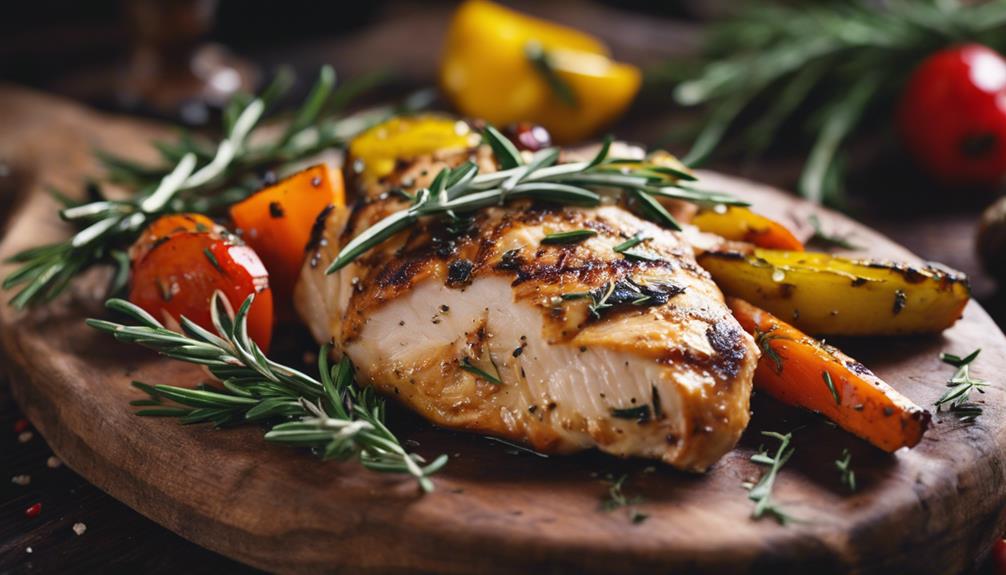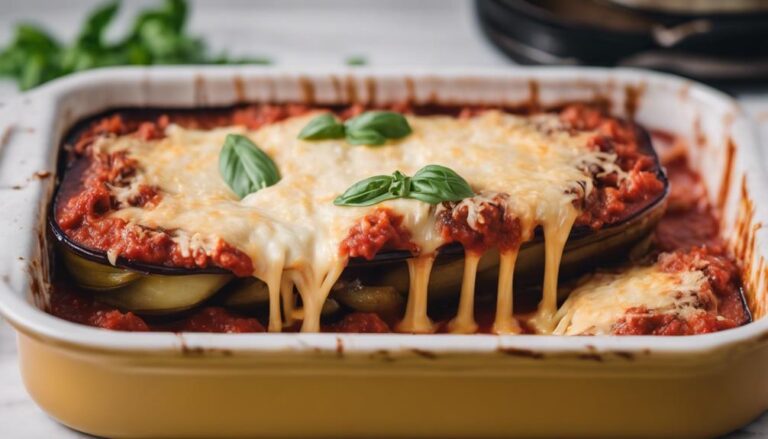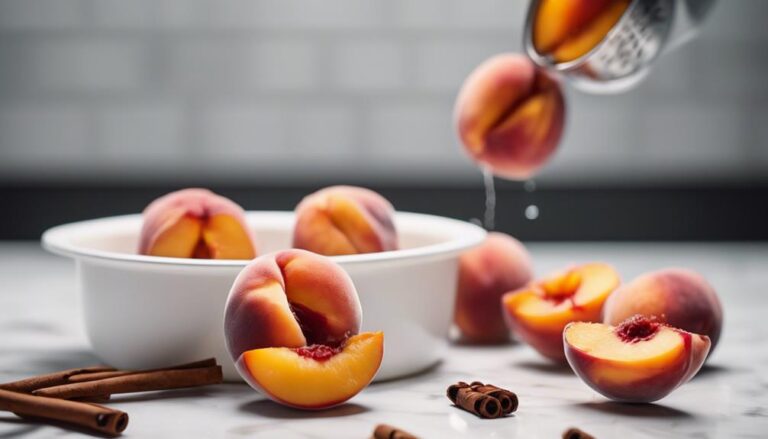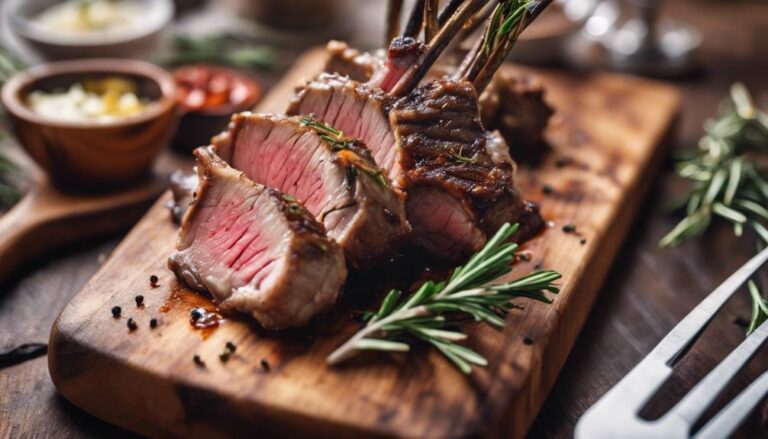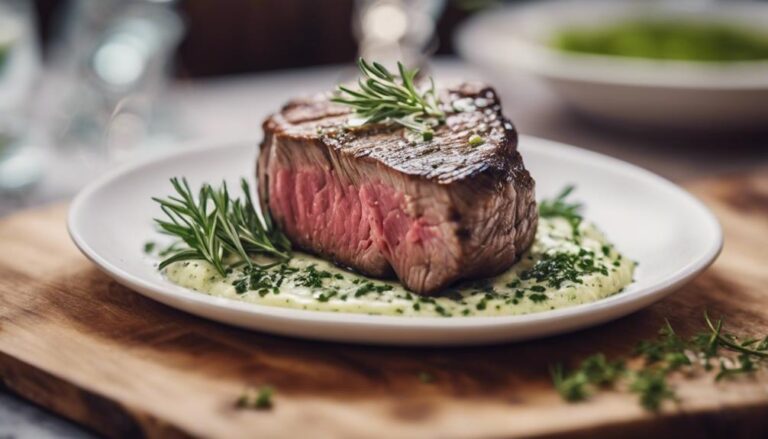Herbed Chicken Breast
Get ready to savor herbed chicken breast, a dish brimming with flavorful history and versatile options. Mix rosemary for a woodsy taste, thyme for a minty kick, or paprika for warmth. These herbs create a symphony of flavors while keeping the chicken tender and juicy. With minimal effort, you'll craft a gourmet-worthy meal suitable for any occasion. Experiment with different herb combinations to elevate the taste profile further. This dish's rich culinary heritage and savory profile make it a favorite worldwide. You're in for a delicious journey exploring the depths of herbed chicken breast.
What You Will Learn Here
- Historical influences from Mediterranean and European cuisines.
- Traditional cooking methods like marinating and pan-searing.
- Regional flavor variations from Mediterranean, Asian, and Latin American cuisines.
- Main seasoning choices: rosemary, thyme, paprika, garlic.
- Herbaceous flavor, tender texture, simple preparation, and versatile pairing options.
Culinary Roots

As you explore the culinary roots of herbed chicken breast,
you'll uncover a rich tapestry of historical culinary influences,
traditional cooking techniques,
and regional flavor variations.
These points offer a glimpse into the diverse ways in which this dish has evolved over time,
reflecting the cultural and gastronomic heritage of different regions.
Understanding these aspects can deepen your appreciation for the complexities and nuances of preparing and savoring herbed chicken breast.
Historical Culinary Influences
Rooted deeply in the traditions of the past, the culinary influences that have shaped herbed chicken breast can be traced back through generations of cooks and cultures. The origins of herbed chicken breast can be linked to ancient Mediterranean cooking practices, where the use of herbs and spices was prevalent in enhancing flavors. Greek and Roman cuisines, known for their sophisticated use of herbs like oregano, thyme, and rosemary, likely contributed to the development of herb-infused chicken dishes.
As time progressed, these culinary traditions spread across continents, influencing dishes in various regions. The concept of seasoning chicken with a blend of herbs became popular in European kitchens during the Middle Ages, with recipes evolving to include local herbs and spices. In the New World, the fusion of European techniques with indigenous ingredients further enriched the culinary landscape, leading to unique herb-infused chicken recipes.
Today, herbed chicken breast stands as a reflection of the enduring legacy of historical culinary influences, showcasing a harmonious blend of flavors that transcends time and borders.
Traditional Cooking Techniques
Delving into the origins of herbed chicken breast, you can explore the traditional cooking techniques that form the culinary roots of this flavorful dish. The preparation of herbed chicken breast often involves classic culinary methods that have been passed down through generations.
One traditional technique commonly used is marinating the chicken in a mixture of herbs, spices, and other flavorful ingredients to enhance its taste and tenderness. This marinating process allows the chicken to absorb the flavors, resulting in a more delicious and aromatic dish.
Another common traditional cooking technique is pan-searing the chicken breast to achieve a crispy and golden-brown exterior while ensuring that the meat remains juicy and tender on the inside. This method helps to seal in the juices and flavors of the chicken, creating a mouthwatering final product.
Additionally, baking or grilling the herbed chicken breast is a popular approach that imparts a smoky and charred flavor to the dish, adding depth to its overall taste profile. These traditional cooking techniques not only contribute to the deliciousness of herbed chicken breast but also showcase the rich culinary heritage behind this beloved dish.
Regional Flavor Variations
To explore the culinary roots and regional flavor variations of herbed chicken breast, consider the diverse influences that have shaped the unique taste profiles of this dish. The flavors of herbed chicken breast can vary markedly based on the region where it's prepared.
In Mediterranean regions, you may find a blend of aromatic herbs like oregano, thyme, and rosemary, reflecting the traditional flavors of that area. In Asian cuisine, herbed chicken breast might feature ingredients like ginger, lemongrass, and cilantro, offering a fusion of herbs and spices unique to that part of the world. In Latin American countries, a combination of cumin, paprika, and garlic could be prevalent, adding a bold and zesty twist to the dish.
Each region's culinary heritage plays a significant role in shaping the flavor profile of herbed chicken breast, making it a versatile and adaptable dish that can cater to diverse taste preferences. Whether you prefer the earthy notes of Mediterranean herbs or the vibrant spices of Latin America, there's a regional variation of herbed chicken breast to suit every palate.
Main Seasoning Choices
For the best flavor, consider experimenting with different herbs and spices when selecting your main seasoning choices for the herbed chicken breast. Here are some popular options to enhance the taste of your dish:
- Rosemary: This aromatic herb adds a woody, pine-like flavor to the chicken, creating a savory and invigorating taste profile.
- Thyme: With its slightly minty and lemony notes, thyme brings a rejuvenating and herbaceous taste to the chicken, complementing its natural flavors.
- Paprika: Whether you choose sweet, smoked, or spicy paprika, this vibrant spice adds a rich color and a hint of warmth to the herbed chicken breast.
- Garlic: A classic choice for seasoning, garlic offers a pungent and robust flavor that pairs well with the herbs and elevates the overall taste of the dish.
Experimenting with a combination of these seasonings can help you create a delicious and well-balanced herbed chicken breast that suits your preferences. Don't be afraid to adjust the quantities to match your taste preferences and discover your favorite flavor profile. Remember to season the chicken generously for the best results, ensuring that each bite is bursting with delicious flavors.
Top-Rated Chicken Dishes
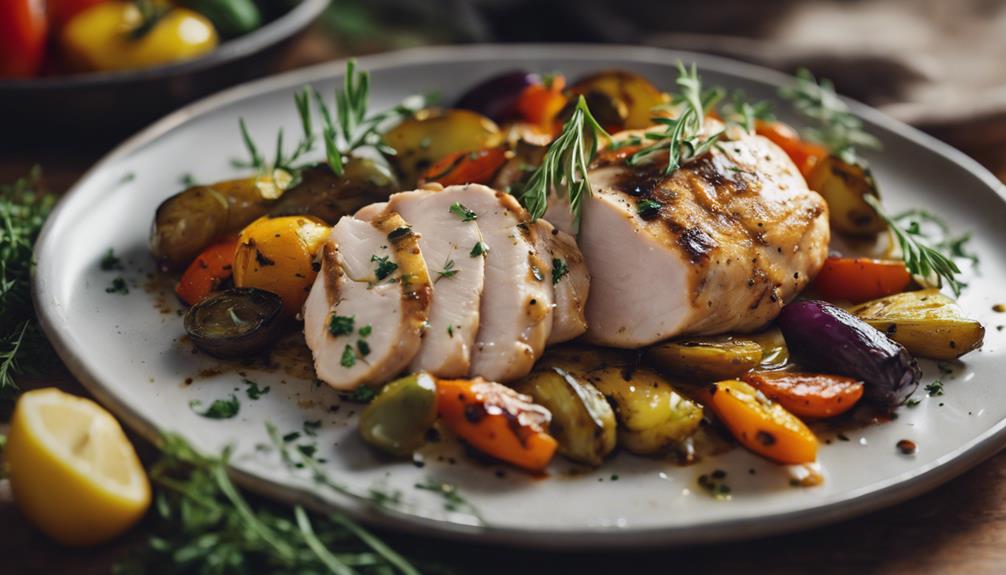
When it comes to top-rated chicken dishes, you can't go wrong with options like Tender Lemon Herb Chicken, Savory Garlic Chicken, and Rosemary Roasted Chicken.
These flavorful recipes have garnered praise for their delicious taste and easy preparation.
Whether you're cooking for a special occasion or a weeknight dinner, these dishes are sure to impress your taste buds.
Tender Lemon Herb Chicken
Indulge in the succulent flavors of this top-rated Tender Lemon Herb Chicken dish. This recipe combines zesty lemon with aromatic herbs to create a mouthwatering chicken dish that's sure to impress your taste buds.
Here are some reasons why you should try this delectable dish:
- The lemon adds a revitalizing citrusy tang to the chicken, enhancing its flavor profile.
- The blend of herbs infuses the chicken with a savory depth of taste that will leave you craving more.
- The chicken is cooked to perfection, ensuring a juicy and tender texture with every bite.
- This dish is versatile and pairs well with a variety of sides, making it a fantastic option for any mealtime.
Whether you're looking for a quick weeknight dinner or a dish to impress your guests, this Tender Lemon Herb Chicken is a surefire winner. Give it a try and elevate your chicken game to a whole new level!
Savory Garlic Chicken
Savor the irresistible flavors of our top-rated Savory Garlic Chicken dish, a culinary delight that will leave your taste buds craving more. This delectable chicken entree is a perfect blend of savory garlic, tender chicken breast, and aromatic herbs that create a mouthwatering experience.
Here are some reasons why this dish stands out:
- Garlic Infusion: Each bite is packed with the bold and rich flavor of garlic that enhances the taste of the tender chicken.
- Juicy Chicken Breast: The chicken breast is cooked to perfection, ensuring a juicy and succulent texture in every bite.
- Aromatic Herbs: A medley of fragrant herbs elevates the dish, adding depth and complexity to the overall flavor profile.
- Versatile Dish: Whether served with a side of roasted vegetables or atop a bed of fluffy rice, this Savory Garlic Chicken is a versatile option for any mealtime.
Indulge in this savory delight and experience a burst of flavors that will keep you coming back for more.
Rosemary Roasted Chicken
If you're a fan of savory garlic chicken, you'll love the aromatic twist of rosemary in our top-rated Rosemary Roasted Chicken dish. This flavorful recipe combines tender chicken breast with the earthy and pine-like taste of rosemary, creating a mouthwatering experience that will have you coming back for more. Here are some reasons why this dish stands out:
- Herbaceous Flavor: The rosemary infuses the chicken with a fragrant and herbaceous flavor profile.
- Tender and Juicy: The roasting process guarantees that the chicken breast stays tender and juicy.
- Simple Preparation: With just a few simple ingredients, you can create a gourmet-worthy dish in no time.
- Versatile Dish: This Rosemary Roasted Chicken can be paired with a variety of sides, making it a versatile option for any occasion.
Experience the delightful combination of rosemary and chicken with this delectable recipe that's sure to become a favorite in your household.
Herb-infused Chicken Cooking Techniques
When cooking herb-infused chicken, it's important to contemplate flavorful herb combinations to enhance taste. Guarantee proper marinating times to allow the flavors to penetrate the meat fully.
Adjust cooking temperatures accordingly for juicy and delicious herb-infused chicken breasts.
Flavorful Herb Combinations
To enhance the flavor of your herbed chicken breast, consider experimenting with different herb combinations to create a uniquely delicious dish. Herbs play a vital role in elevating the taste profile of your chicken, adding depth and complexity. Common herbs like rosemary, thyme, and oregano are popular choices that pair well with chicken, providing earthy and aromatic notes.
For a Mediterranean twist, try combining basil, parsley, and garlic for a vibrant and fresh flavor. If you prefer a more savory profile, a blend of sage, marjoram, and parsley can offer a robust and herbaceous taste. Experiment with ratios to find the perfect balance that suits your palate.
Remember that fresh herbs will deliver a more intense flavor compared to dried ones, so adjust accordingly. Don't be afraid to mix and match different herbs to create your signature herb blend. By exploring diverse herb combinations, you can discover a world of culinary possibilities and create mouthwatering herbed chicken dishes that will impress your family and friends.
Proper Marinating Times
For optimal flavor infusion, marinate your herbed chicken breast for at least 2 hours before cooking. Marinating allows the chicken to soak up the delicious herb flavors, resulting in a more tender and flavorful dish. When marinating, make sure to use a mixture of herbs, oil, acid (like vinegar or lemon juice), and seasonings to create a well-rounded taste profile.
During the marinating process, refrigerate the chicken to prevent any bacteria growth. You can marinate the chicken breast in a resealable plastic bag or a covered dish, making sure that the marinade fully coats the chicken for even flavor distribution. If you want a stronger herb taste, consider marinating the chicken for up to 24 hours, but avoid exceeding this time as prolonged marinating can make the chicken mushy.
After marinating, pat the chicken dry before cooking to guarantee a nice sear and prevent excess liquid from affecting the cooking process. By following these marinating guidelines, you'll elevate your herbed chicken breast to a whole new level of deliciousness.
Cooking Temperature Adjustments
To guarantee that the herb flavors are preserved and infused properly when preparing herbed chicken breast, adjust the cooking temperature accordingly. Cooking the chicken breast at a moderate temperature of around 375°F to 400°F helps ensure that the herbs release their flavors gradually, resulting in a more aromatic and flavorful dish. Higher temperatures can cause the herbs to burn quickly, leading to a bitter taste, while lower temperatures may not fully extract the herb essences into the chicken.
When adjusting the cooking temperature, consider using methods like baking or grilling to maintain a consistent heat level throughout the cooking process. These methods allow the herbs to infuse into the chicken evenly, enhancing the overall taste. Remember to preheat the oven or grill to the desired temperature before placing the herbed chicken breast to cook.
Final Thoughts
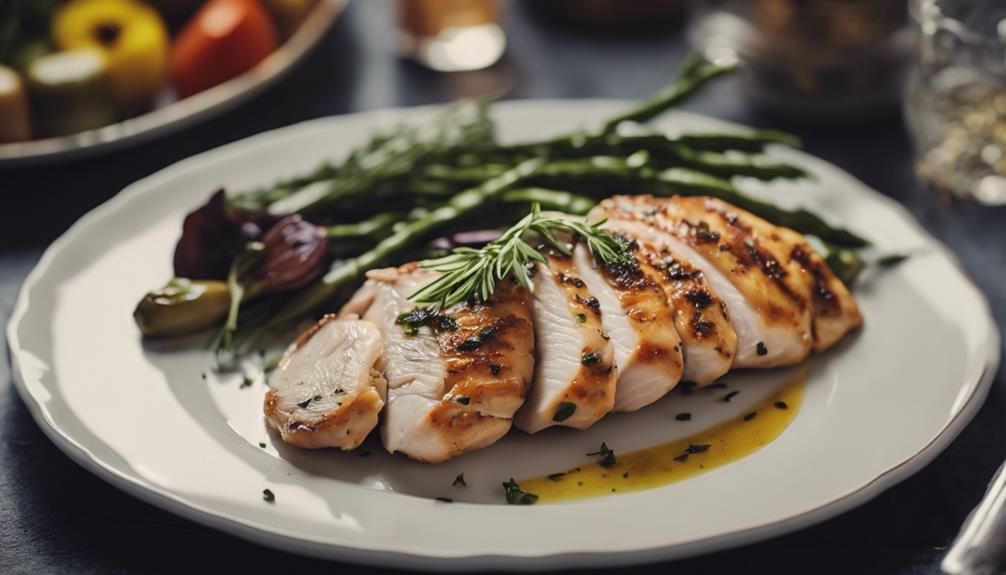
In conclusion, taking these factors into consideration can help you maximize the potential of your herbed chicken breast dish. Cooking chicken breasts with herbs can elevate a simple meal into a flavorful culinary experience. By adjusting the cooking temperature to make sure the chicken is cooked through while staying juicy, you can achieve a perfect balance of flavors and textures.
Experimenting with different herb combinations can add variety to your dishes. From classic choices like rosemary and thyme to more exotic options like tarragon or lavender, herbs can bring unique flavors to your herbed chicken breast. Don't be afraid to mix and match herbs to find the combination that suits your taste preferences best.
Keep in mind that proper seasoning is essential. Salt and pepper may seem basic, but they play a significant role in enhancing the overall taste of your herbed chicken breast. Be generous with seasoning, but remember to taste as you go to avoid over-seasoning.
Frequently Asked Questions
Can I Substitute Fresh Herbs With Dried Herbs in the Recipe?
Yes, you can substitute fresh herbs with dried herbs in the recipe. Just remember to reduce the amount used since dried herbs are more concentrated. Use about a third of the amount of fresh herbs called for.
How Can I Prevent the Chicken Breast From Drying Out During Cooking?
To prevent chicken breast from drying out during cooking, make sure not to overcook it. Use a meat thermometer to check for doneness, and remove it from heat once it reaches the safe internal temperature of 165°F.
Is It Necessary to Marinate the Chicken Breast Before Cooking?
If you're short on time, marinating isn't necessary for chicken breast. However, a simple marinade can add flavor and moisture. Experiment with citrus, yogurt, or herbs to enhance your dish. It's up to you!
Can I Use Skin-On Chicken Breast for This Recipe?
Yes, you can use skin-on chicken breast for this recipe. The skin adds flavor and helps keep the meat moist during cooking. Just make sure it's cooked thoroughly to avoid any food safety concerns.
What Side Dishes Pair Well With Herbed Chicken Breast?
When pairing side dishes with herbed chicken breast, consider options like roasted vegetables, garlic mashed potatoes, or a fresh garden salad. These choices complement the flavors of the chicken and create a satisfying meal.
Conclusion
To sum up, herbed chicken breast is a versatile and flavorful dish that can be enjoyed in a variety of ways. Whether you prefer it grilled, baked, or pan-seared, the combination of herbs and seasonings adds a delicious touch to this classic meal.
Experimenting with different herb-infused cooking techniques can elevate the flavors even further, making it a go-to option for any occasion. Try making this simple yet delicious dish at home and impress your family and friends with your culinary skills.
